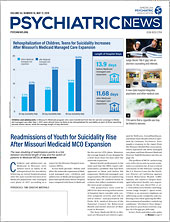It’s been a year since I wrote my first president’s column in Psychiatric News, and I can tell you that the bi-monthly deadlines come faster than you might think when you must try to say something meaningful in each issue. As the 145th APA president, I’ve had the pleasure of working with an exceptional group of leaders on the Board of Trustees and a talented administrative team working mostly behind the scenes to assure the Board has the information needed to make informed decisions and establish policy and implement them.
Since I’ve been around APA for a long time now, I have learned some great lessons from my many friends and mentors who have preceded me in this office. For example, a former president described the presidency as being on call “24/7/365.” As president, you are the official representative of the organization, and whether it’s reviewing a press release and writing a quote for it, testifying before Congress, conducting a press interview, or speaking to an international group, you’re “it” for a year. Although you continue your full-time work elsewhere, the job of being APA president requires that you lead by example, using your psychiatric and personal skills in member as well as organizational interactions and meeting facilitation. While you might aspire to focus on recruitment and retention of members, you must simultaneously respond to current or former members who say, “APA doesn’t speak to me” or “APA isn’t working on issues that are important to me.” You are responsible for setting the agenda for the Board but must be ready to address issues as they arise to provide timely responses.
Another past president taught me to always ask “How will it affect the patients?” You will recall that I wrote a column about staying in our lane, so you know that I firmly believe that our Association must be grounded in professional values and ethical behavior in determining how we care and advocate for our patients. It is how we started and must be part of our future.
My belief that APA must lead the way in areas where American psychiatry still lags began after reading a 1970 article on institutional racism in psychiatry in the American Journal of Psychiatry written by a beloved former medical director. He opened the door for another former president to create a work group, which I was honored to co-chair, to implement the recommendations of the 2001 Surgeon General’s report titled “Mental Health: Culture, Race, and Ethnicity,” which started the process of incorporating them into APA policy and practice, work that continues today.
As an organization, we entered the new millennium dealing with critical issues important to us, our Association, and our profession—mental health parity, adequate reimbursement, quality of care standards, appropriate training and research, collaboration and advocacy with other groups, and APA’s role in addressing what we now call the social determinants of mental health. I see psychiatrists as “citizen professionals in a civil society,” and while work on these important issues remains to be done, we will never give up.
As president, you also learn you won’t please everyone, and things you say or do get misrepresented all the time. However, you also see the resiliency in members who continue to provide great care and advocate for patients, sometimes under the most difficult circumstances, and hear stories from the field that encourage and inspire us all. We are the 21st-century APA—175 years from where we started, but still a profession based on standards, values, and ethics and dedicated to the welfare of our patients and members.
As I depart office, I want to thank my predecessor, Dr. Anita Everett, for setting an agenda that a “seasoned” community psychiatrist like me could support and build upon. And thanks and congratulations to our next president, Dr. Bruce Schwartz, for being a great teammate over the past year. I look forward to returning the favor during your term, and I know it will be another great year for APA. Thanks also to the entire APA staff, who work tirelessly every day to achieve the mission and goals of the organization. And finally, my sincere thanks to you members for your unwavering support of APA, its goals and mission, and the people we serve.
So, as I bid you adieu, let me say goodbye “one last time” in several of the languages I’ve had the chance to practice over the past year: adios, au revoir, ciao, sayonara, auf wiedersehen, bay-bay, kwa heri, and totsiens! ■

